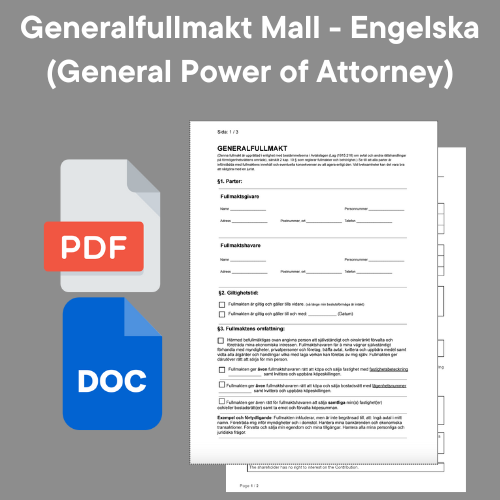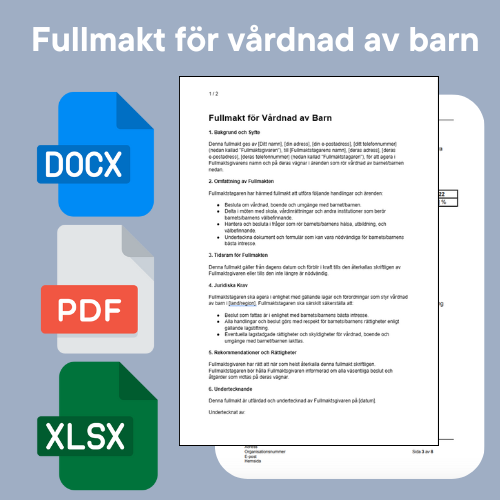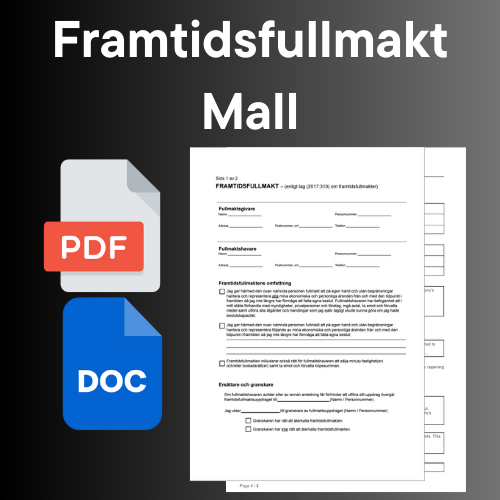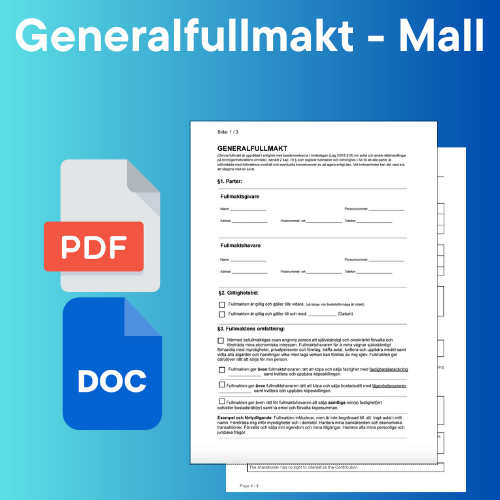Future power of attorney English - Guide
Share
Power of Attorney in English - A Complete Guide
A power of attorney is an important legal document that enables a person to appoint someone else to manage their personal and financial affairs in the event of illness, mental illness, or other incapacity to make their own decisions. This article aims to provide a comprehensive guide to what a power of attorney is, how it can be used internationally, and what legal requirements and challenges may arise.
Table of contents
- What is a power of attorney?
- Future power of attorney in English
- Validity abroad
- Legal requirements and formalities
- Common mistakes to avoid
- Examples of legal disputes
- Summary
What is a power of attorney?
A power of attorney for the future is a power of attorney that comes into effect when the person who issued it (the power of attorney) can no longer take care of his affairs. This may be due to illness, mental disorder, or old age. The purpose of a future power of attorney is to ensure that the interests of the power of attorney are protected even when he loses the ability to make decisions himself.
In Sweden, future powers of attorney are regulated by the Future Powers of Attorney Act (2017:310). For a power of attorney to be valid, it must be in writing, signed by the person giving the power of attorney, and witnessed by two people. The power of attorney must also be 18 years of age and of sound mind at the time of signing.
Future power of attorney in English
When it comes to writing a power of attorney in English, especially if you plan for it to be valid abroad, it is important to understand the legal terminology and requirements in both Sweden and the country where the power of attorney may need to be used.
In English, a future power of attorney is called "Enduring Power of Attorney" (EPOA). This term is used in many English-speaking countries, including the United Kingdom, the United States, and Australia. An EPOA is designed to continue to be valid even after the grantor has lost his decision-making capacity, making it a close equivalent to the Swedish future power of attorney.
Validity abroad
A Swedish future power of attorney is not automatically valid abroad. It depends on the other country's legal system and whether they recognize a similar type of power of attorney. In some countries, it may be necessary to translate the document and in some cases even have it legalized in order for it to be recognized as valid.
If the grantor has assets or interests in several countries, it may be appropriate to establish separate future powers of attorney according to each country's legislation. This ensures that no legal obstacles arise if the power of attorney needs to be used internationally.
Legal requirements and formalities
In order for a power of attorney to be valid according to Swedish law, it must meet the following requirements:
- Writing: The power of attorney must be in writing.
- Witnessing: Two witnesses must witness the signature of the power of attorney.
- Capacity to make decisions: The person giving the power of attorney must be of sound mind at the time of signing.
- Specificity: The power of attorney should clearly specify what powers the power of attorney holder has.
In legal disputes, it is common for the validity of a future power of attorney to be questioned, especially if there is uncertainty about the mental state of the power of attorney at the time of the signature. It is therefore crucial that all documentation is handled carefully to avoid potential problems.
Common mistakes to avoid
When drawing up a future power of attorney, it is important to avoid some common mistakes:
- Unclear instructions: Be specific in what powers are given to the power of attorney.
- Improper testimony: Ensure that the witnesses are independent and that they meet the requirements of the law.
- Delayed registration: Do not wait to register the power of attorney if this is required in the country where it is to be used.
Examples of legal disputes
There are several cases where future powers of attorney have led to legal disputes, often due to ambiguities in the document or questions surrounding the mental state of the power of attorney at the time of signing. In one case in Sweden, an heir questioned the validity of a future power of attorney, citing that the power of attorney was suffering from dementia at the time of the signature. After a long legal process, the court determined that the power of attorney was valid because it met all formal requirements and there was insufficient evidence to question the power of attorney's decision-making capacity at the time.
Summary
A power of attorney is a powerful tool to ensure that your interests are protected even if you lose the ability to make your own decisions. By carefully following the legal requirements and avoiding common mistakes, you can minimize the risk of future disputes and ensure that your future power of attorney is valid both in Sweden and internationally.




